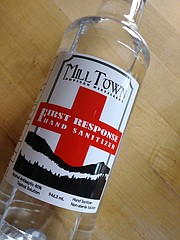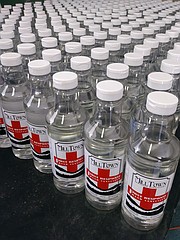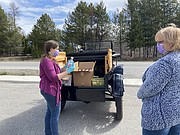Mill Town Distillery crafts hand sanitizer
BONNERS FERRY — Hand sanitizer was one of the first items to disappear from the stores and it became clear early on that it would remain a hard-to-find item.
When Andrew O’Neel, director of the Boundary County Office of Emergency Management, heard that Sandpoint’s Mill Town Distillery was going to be producing hand sanitizer instead of its normal top notch vodka, he contacted people he knew in Bonner County is they could connect him with the distillery’s owners.
“At the time we weren’t using any more than was usual, but we could see we would run out eventually if we didn’t find an alternate source soon,” O’Neel said.
After speaking with the distillery’s Jessie Vachon, Boundary County arranged to purchase a large quantity of hand sanitizer from the Mill Town Distillery to ensure the community’s firefighters and law enforcement, emergency medical services, healthcare facilities and others had something they could use to bridge the supply gap.
“Many of our emergency responders don’t have access to soap and water to wash their hands while in the field or are at a higher risk than the general public due to the location and nature of their jobs,” O’Neel said. “Huge thanks to Mill Town Distillery for creating hand sanitizer so our emergency service providers can keep safely doing what they do. This is a great example of the brilliance of our local business sector and our community’s ability to quickly adapt to new conditions with ingenious solutions.”
Ensuring those first responders had what they need to do their job is exactly why Mill Town turned their 400-gallon still from producing top-notch vodka to hand sanitizer.
Not used to sitting around, Vachon, husband Victor Vachon and partner Bryan Egland were at a bit of loose ends due to social distancing requirements and Idaho’s stay-at-home orders. Then they heard that hand sanitizer was in critically short supply and realized they could help and began the process of converting a still that had been used to produce local, top-notch vodka into producing hand sanitizer.
“I think it’s awesome,” Vachon said of being able to help the community. “I mean we spent a lot of time sitting around thinking, just feeling helpless. We were stuck at home and it felt like there wasn’t anything we could do but then we heard people talking about the hand sanitizer. We talked it over and well if they can get this going there then maybe this is an option for us.”
Recently the Food and Drug Administration, Alcohol and Tobacco Tax and Trade Bureau, World Health Organization, and the craft spirits industry came together to lift restrictions on the production of hand sanitizer. Many distillers in the spirits industry are in the unique position to shift production from liquor to ethanol used for hand sanitizer. Mill Town is one of those distilleries that was able to pivot to make the much-sought-after product.
It took weeks of planning and scrambling to find packaging and the necessary raw ingredients as well as wading through pages of constantly changing — and the logistics of adapting equipment to a new use, but Mill Town was finally able to start producing its first batch of hand sanitizer a few weeks ago.
The process is much the same as when they make Mill Town’s vodka — making the mash, distilling it and then proofing it but now the distillery’s team is taking that alcohol and adding the ingredients needed to turn it into hand sanitizer.
While it “hurts a little bit” to push everything through the still so quickly and not take their normal time to make the top-notch vodka the craft distillery is becoming renowned for, Vachon said the Mill Town team wouldn’t have it any other way for right now.
“We make alcohol like we normally do. We’re just making really terrible alcohol, right now,” Vachon said, chuckling. “Like don’t drink this. This is not good.”
While the mash can take several days or more to ferment, followed by the distilling process and the rest, Vachon estimates Mill Town will be able to produce about 150 gallons per week.
“It’s [a lot] for us,” she said, chuckling lightly. “But it’s not for people who make hand sanitizer for a living.”
Unlike some craft distilleries which are charging as much as $100 a gallon, Vachon said they wanted to keep the price fair. The price they charge essential workers is just above their cost to make the hand sanitizer with the cost to the general public just a few dollars more.
While there is a huge demand, Vachon said people have also been great about buying just what they need to ensure as many people as possible are able to get some. People are also excited that someone locally has been able to made the product and want to help Mill Town by buying the local product, she said.
“I’m just glad we can do something that’s helpful,” Vachon added. “It makes me feel a little more empowered to be able to not just sit and watch it, to have something to do where we can help.”
Because they have a larger still than most craft operations — Mill Town’s still is 400 gallons compared to the 50- to 75-gallon stills operated by most — the Bonner County distillery is able to make a lot more product a lot faster.
The biggest “bottleneck” is the mashing process — a four- to five-day process. From start to finish, Vachon estimated it takes Mill Town about a week to a week-and-a-half to complete the process to make the hand sanitizer.
“It’s not too bad,” she said. “My husband was starting to feel like it was taking him forever and one of our friends said, ‘You just started this two weeks ago.’ When you look at it that way, when you go from making something sort of similar but not really to a whole new process, new ingredients, getting everything in and sourced in two weeks, that’s really pretty fast.”
Sourcing the ingredients was frustrating, especially at first when the agencies were requiring isopropyl alcohol as the denaturant that had to be used. Unfortunately, the product was available anywhere. However, other denaturants were soon accepted and Mill Town was able to track down those ingredients.
“It’s been a struggle but once we got confirmation on the last ingredients we needed, I felt like I said, empowered that we could actually do something that was helpful. That’s my biggest thing. I’m a doer. I help friends, I help other people. That’s just what I do. So that’s been really good for me.”
The farm-to-bottle distillery grows a lot of its own grains, which helped make their temporary transition into a hand sanitizer company possible, Vachon said. They had grain in their silos on their farm and knew they could make the alcohol needed to make the product and they didn’t have to order anything.
“We’re small, we have a farm. We’re farmers that distill,” Vachon said with a laugh. “We’re very invested in our community, both of us have lived here our whole lives pretty much and it’s a big thing for us [to be able to help.]”
The couple took over the farm from her husband Victor’s family and were exploring what to do with the farm. They’d tossed around several ideas but finally realized the spot was perfect to start a local craft distillery.
“It’s too small to actually be a profitable farm but it’s just the right size to grow grain for a distillery,” she said. “The other cool thing is the property that we’re on, in the ’30s, there were a couple of bothers who lived there, they had a still. We found pieces of it. The story is at one point, they heard the sheriff was coming out so they burned their still house to the ground. But we found the foundation and we use the same spring water, which I think is really cool. So there was always that there. And that did influence what we decided to do.”
Once word got out that Mill Town was making hand sanitizer and would soon have some available, Vachon said she spent several days answering messages and emails from community members eager to know more. A post to Facebook alerting the public she would be selling the 78 bottles not earmarked for emergency services — Bonner, Boundary and Pend Oreille counties are among those who have put in orders — and other frontline healthcare providers attracted more than 100 reactions and responses for people wanting to know more.
Shortly after they set up at 10 a.m., a steady stream of cars and trucks pulled into the parking lot of Emerald Automotive to pick up their orders. By 11:30 a.m., they’d sold out.
The next batch is well on its way and Mill Town plans to keep making hand sanitizer as long as the community needs it. While the deregulations allowing distilleries to make the over-the-counter product expire on June 30, Vachon said that officials have told them that it could be extended if the need is there. And, if the deregulations are extended, and the need is still there, she said Mill Town will keep producing hand sanitizer for the community.
The distillery is following WHO guidelines to create a denatured 80 percent alcohol hand sanitizer. The 32-ounce bottles, which are perfect to refill smaller hand pump bottles.
Local connections and companies have helped make the hand sanitizer project possible, Vachon. MickDuff’s Brewing Company donated some beer that was going bad and the hand sanitizer created with that is going to be donated to local groups such as the food bank and other nonprofits. Getting several pallets of the bottles from Litehouse at a bargain price also helped, allowing Mill Town to donate even more to the front line crews in need of hand sanitizer.
“We’re very happy to be able to provide a much-needed product, help take care of our neighbors and the people who mean so much to us, and help to support our community while also providing an avenue to help us keep our doors open,” Vachon said.
To order or for information, email Jessie Vachon at jessie@milltowndistillery.com or find them on Facebook at facebook.com/MillTownDistillery. The cost is $13 for a 32-ounce bottle with a $5 discount for essential workers.
• • •
Caroline Lobsinger can be reached by email at clobsinger@bonnercountydailybee.com.
and follow her on Twitter @CarolDailyBee.







